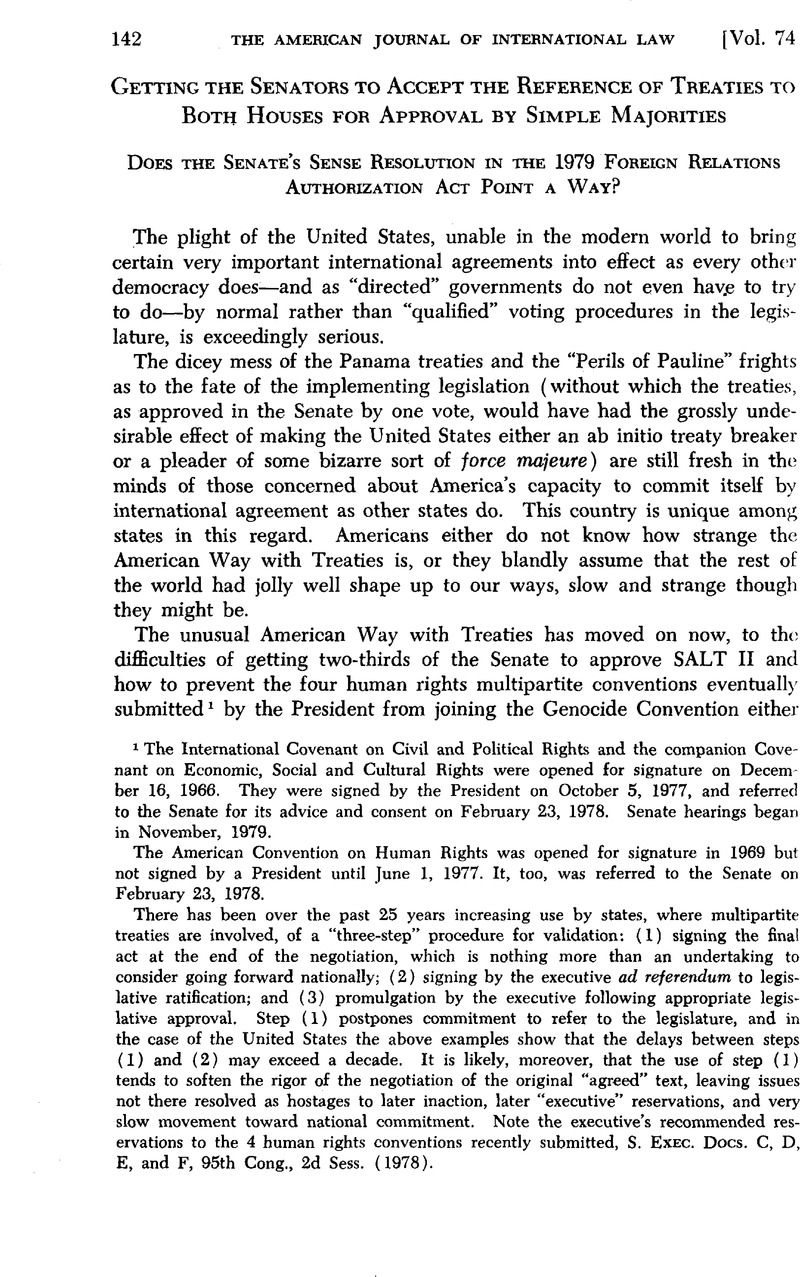No CrossRef data available.
Published online by Cambridge University Press: 27 February 2017

1 The International Covenant on Civil and Political Rights and the companion Covenant on Economic, Social and Cultural Rights were opened for signature on December 16, 1966. They were signed by the President on October 5, 1977, and referred to the Senate for its advice and consent on February 23, 1978. Senate hearings began in November, 1979.
The American Convention on Human Rights was opened for signature in 1969 but not signed by a President until June 1, 1977. It, too, was referred to the Senate on February 23, 1978.
There has been over the past 25 years increasing use by states, where multipartite treaties are involved, of a “three-step” procedure for validation: (1) signing the final act at the end of the negotiation, which is nothing more than an undertaking to consider going forward nationally; (2) signing by the executive ad referendum to legislative ratification; and (3) promulgation by the executive following appropriate legislative approval. Step (1) postpones commitment to refer to the legislature, and in the case of the United States the above examples show that the delays between steps (1) and (2) may exceed a decade. It is likely, moreover, that the use of step (1) tends to soften the rigor of the negotiation of the original “agreed” text, leaving issues not there resolved as hostages to later inaction, later “executive” reservations, and very slow movement toward national commitment. Note the executive’s recommended reservations to the 4 human rights conventions recently submitted, S. Exec. Docs. C, D, E, and F, 95th Cong., 2d Sess. (1978).
2 By analogy to the place at El Escorial where the bodies of Spain’s royalty lie until suitably diminished in bulk for burial in the walls of the Hall of Kings. My translation softens the Spanish term, “Sala de Pudredía.”
3 Compare Goldwater v. Carter (D.D.C. June 6, 1979), reprinted in 125 Cong. Rec. S7050 (daily ed. June 6, 1979), Amended, 48 U.S.L.W. 2278 (Oct. 17, 1979), rev’d, 48 U.S.L.W. 2388 (D.C. Cir. Nov. 30, 1979), vacated and remanded with directions to dismiss, 48 U.S.L.W. 3402 (Sup. Ct. Dec. 13, 1979).
4 Oliver, issue paper for A Bicentennial Conference on the Constitution, American Academy of Political and Social Science, Topic IV: The Constitution and Foreign Affairs in America’s Third Century, The United States and the World, 426 The Annals of the AAPSS 166 (1976); Leech, Report of Committee IV, id. at 204.
5 Specifically because of the uncertain contours of the court–discovered individual federal legislator’s separation of powers-based (?) cause of action to appeal to the courts to redress an asserted executive deprivation of the legislator’s “right to vote” on a measure. Compare Kennedy v. Sampson (511 F.2d 430 (D.C. Cir. 1974)) and its progeny and the district court decision in Goldwater, supra note 3. These are not cases in which prior resort has been made by the claimant to support, by enacted bill, joint resolution, or concurrent resolution of the two chambers of the Congress. In Goldwater the district court found a textual (not practice) gap in the (written) Constitution on the power to end a treaty in accordance with its own termination clause, and at the behest of plaintiff legislators proceeded to fill the gap on grounds that are not clearly developed and without taking into account governmental practice under the evolving Constitution.
6 The Framers gave the Senate a power to deny treaties by one-third plus one vote as a part of a set of political compromises between the larger and the small 13 original states. The Senate was used because each state legislature had 2 votes there. A motion to reduce the Senate vote to a simple majority failed by 1 vote. With the addition of 37 more states—many out of the western lands claimed by even small original states—and the direct election of senators under the 17th Amendment, the inward-looking compromise in Article II has become nothing more than a traditional prerogative of the Senate which now interferes with effective foreign affairs operations and is essentially undemocratic.
7 Joint Explanation of the Committee of Conference, H. Conf. Rep. NO. 95–1535, 95th Cong., 2d Sess. 64, reprinted in [1978] U.S. Code Coxg. & Ad. News 2480, 2505.
8 “The Federal Elections Commission case,” 424 U.S. 1 (1976), states that as Congress cannot “manage,” it cannot be authorized by statute to appoint a congressional quota of managers to the commission.